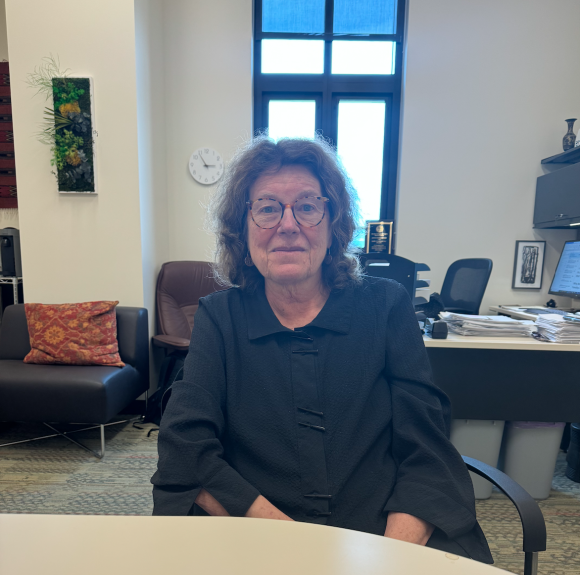
Leslie Leinwand sits down for an interview with CU Independent writer Vanessa Arambula. (Vanessa Arambula/ CU Independent)
Heart disease is at the forefront of University of Colorado Boulder professor Leslie Leinwand’s mind in February.
Heart disease is the number one killer of women, and during American Heart Month, women are encouraged to advocate for their health and speak up about their experiences. With 20 years of experience in the field of heart health research, Leinwand reflected on her career and talked about ways women can work to protect their hearts.
In embarking on her career path, Leinwand initially didn’t know what she wanted to pursue.
“I don’t think I even knew what a scientist did or was. When I went to college I thought I wanted to go to medical school because that seemed like a good profession to be in,” Leinwand said.
She took on a research role in a lab at Cornell University to buff up her resume for medical school, but ultimately, the research aspect of science captured her heart.
“I never looked back and wished I went to medical school, I never felt that way,” Leinwand said. “… I’m most passionate – and this is going to sound hokey – about learning new things, and that’s what you get to do all the time in science… We can speculate about stuff and then just do experiments and find the answer.”
She received her Ph.D. and post-doctorate at Yale University and Rockefeller University respectively, both in molecular biology. In 1981 she joined the faculty of Albert Einstein College of Medicine in New York where she was recruited to come to Boulder to be the chair of molecular, cellular and developmental biology.
As a self-described “East Coast person” who had never visited Boulder, the change appeared intimidating at first. However, after experiencing Boulder, she was swayed by the diverse scientific perspectives she could seek out at a large university. Leinwand has remained in Boulder ever since.
In her time studying heart disease, Leinwand discovered that studies on heart health greatly underrepresented women. Leinwand detailed the discrepancy and its impacts in her talk on Jan. 24 titled “A Woman is not a Small Man: Sex Differences in the Heart.”
“We looked at the inclusion of women in clinical trials for heart disease and found it to be very low– as I mentioned 18%– which is really bad,” Leinwand said. “And when we looked at studies in laboratory animals, most of the time they were being done on male animals, and the more I dug the more I found out that very little was being done.”
Leinwand and Roy Parker, the director of BioFrontiers Institute, paired together to create the event as a part of a series of scientific talks entitled “Public Talks For Public Good.”
“The idea of this whole institute is to bring people together across different disciplines to work on big problems,” Parker said. “… One of the things that Leslie and I thought was really important is that we communicate not only with the university but with the general community and public, to have a series of talks that people care about.”
Both Leinwand and Parker said they believe communication is important for scientists because they can encourage the public to seek ways to take care of their bodies.
“This is something that we have been working on for a long time and I wanted to share what me, the scientists and the community discovered over the decades,” Leinwand said.
For college-age women to reduce their risk of heart disease, Leinwand said it is important “not to smoke, for one thing. Get exercise. Be cognizant of what you eat and how you live your life. You want to try and reduce stress if possible.”
Colorado ranks as one of the five states in the U.S. with the lowest rate of heart disease mortality. According to a study by Forbes Health, Colorado ranks number one for heart health with the lowest rates of obesity, sleep deprivation and high blood pressure.
“Living in Colorado… we’re a pretty healthy state,” Leinwand said. “People exercise all the time and smoking is pretty low relative to other parts of the country.”
Leinwand continues to use her work at CU Boulder to bring light to heart health discrepancies in women. Despite spending the last two decades in heart health research, she still enjoys every minute of her work.
“The sense of discovery, the fact that you can ask questions and do experiments and have them result into something that can help treat heart disease or prevent heart disease, that’s probably the most rewarding part,” Leinwand said.
She added that teaching, while not an aspect of the scientific career she initially considered, has become close to her heart.
“One of the things that has been defining for me has been being able to affect, in a positive way, student experiences by teaching,” Leinwand said. “I’m proud to be a member of the faculty at the University of Colorado, I think we do a great job in furthering science.”
Contact CU Independent staff writer Vanessa Arambula at Vanessa.Arambula@colorado.edu
